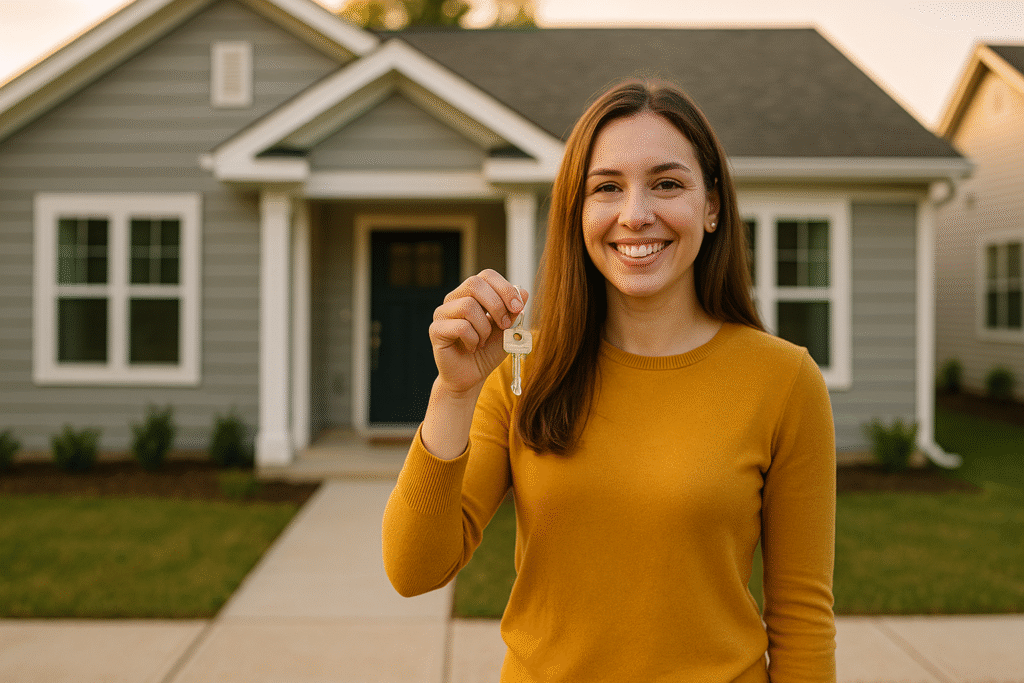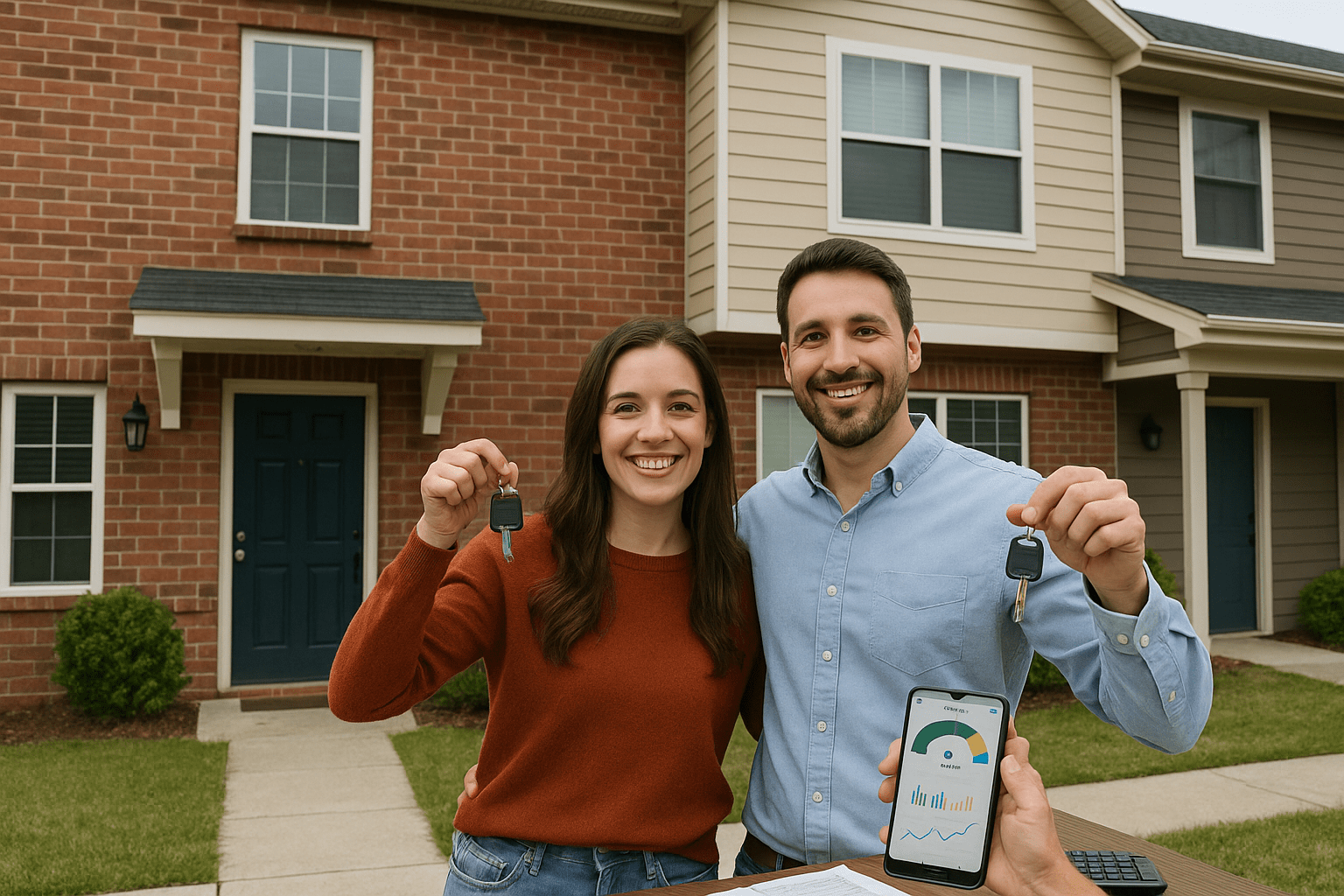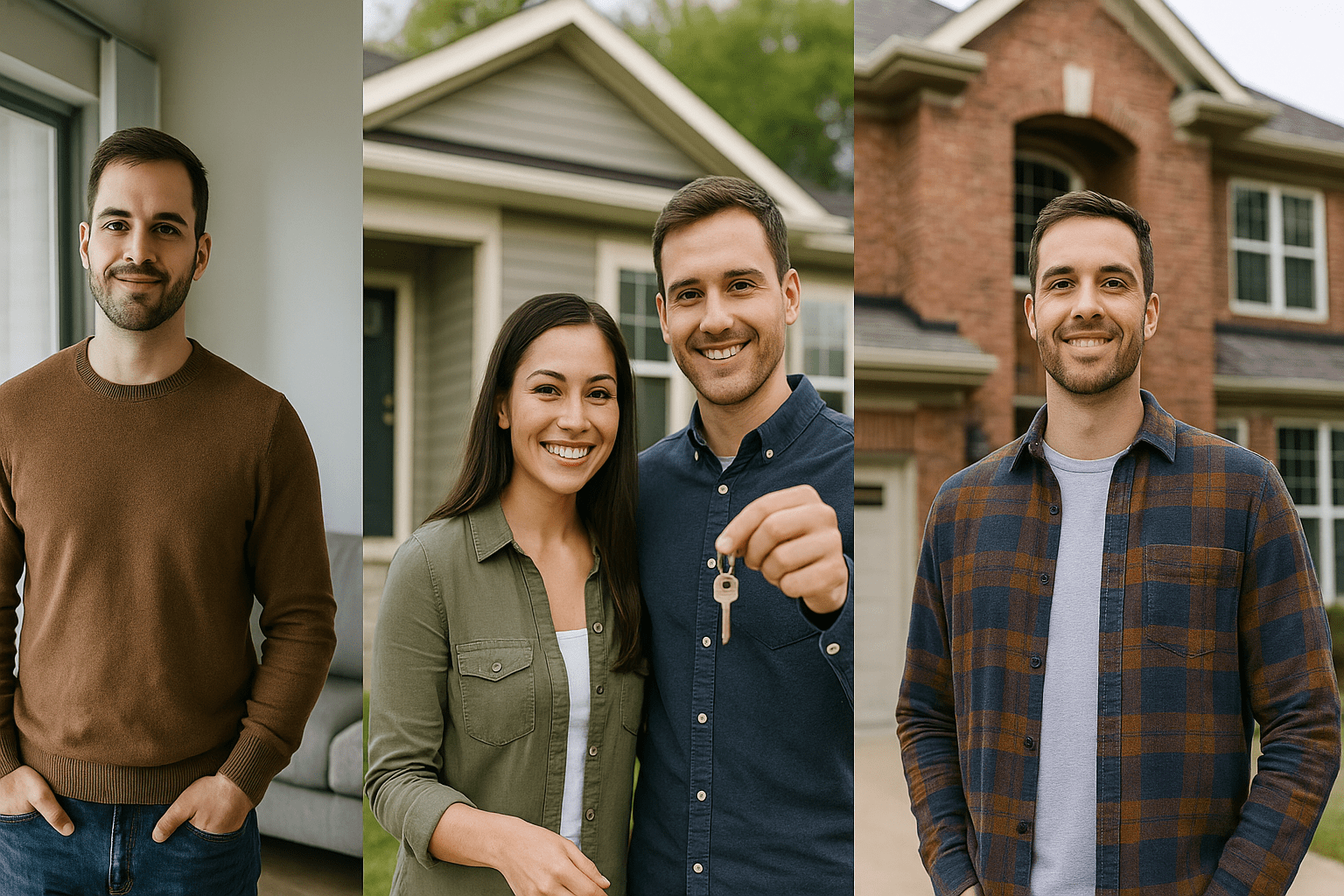Buying Your First Home: Success Stories of Young Adults Who Did It Before 30
Buying Your First Home: Success Stories of Young Adults Who Did It Before 30

Buying Your First Home: How Real Twenty-Somethings Achieved Homeownership
Whether you’re a young adult wondering if homeownership before thirty is realistic or a parent watching your twenty-something navigate this journey, real success stories provide both inspiration and practical roadmaps. These aren’t trust fund kids or lottery winners—they’re normal young adults who used strategic planning, available programs, and smart choices to build wealth early.
In this guide, you’ll discover:
- Real stories of young adults who bought before age thirty
- Specific strategies each person used to overcome obstacles
- Common patterns among successful young buyers
- Mistakes they avoided that derail most attempts
- Actionable lessons you can apply to your own journey
The young adults building wealth through homeownership in their twenties followed different paths, but certain principles appear in every success story.
Ready to write your own success story? Schedule a call to discuss your path to homeownership and learn from strategies that have worked for hundreds of young buyers.
Story #1: Marcus – The House Hacker Who Eliminated Rent at 24
Starting Point:
- Age: 22, recent college graduate
- Income: $52,000 entry-level marketing job
- Debt: $28,000 student loans
- Savings: $3,000
- Credit Score: 680
The Challenge: Marcus was paying $1,200 monthly rent while trying to save for a down payment and pay student loans. At that rate, buying a home seemed decades away.
The Strategy: Marcus discovered house hacking through online research. Instead of buying a single-family home he couldn’t afford, he pursued a fourplex using an FHA loan requiring only 3.5% down.
The Execution:
- Saved aggressively for 18 months while living with roommates
- Parents gifted $8,000 toward down payment
- Found fourplex priced at $380,000 in up-and-coming neighborhood
- Down payment: $13,300 (3.5%)
- Mortgage payment: $2,650 monthly
- Rented three units at $1,100 each = $3,300 monthly income
- Net cash flow: $650 monthly (plus free housing)
The Result at Age 26 (Two Years Later):
- Built $45,000 in equity through appreciation and principal paydown
- Lived rent-free for 24 months
- Generated $15,600 in positive cash flow
- Used experience to purchase second property
- Total wealth created: $60,600 in two years vs. $28,800 paid in rent alternative
Key Lesson: “I thought I needed to save for years to afford a ‘real’ house. Learning about house hacking showed me I could start building wealth immediately while solving my housing problem. The rent from my tenants built my net worth while I lived for free.”
Use the rental property calculator to model house hacking scenarios in your market like Marcus did.

Story #2: Sarah – The Conventional Buyer Who Saved Systematically at 27
Starting Point:
- Age: 24, working as a nurse
- Income: $68,000
- Debt: $15,000 car loan, minimal credit card balance
- Savings: $12,000
- Credit Score: 720
The Challenge: Sarah wanted to buy a condo near her hospital but home prices in her market were high. She needed to save substantial down payment while managing student debt.
The Strategy: Sarah chose a conventional loan path with 5% down payment, planning methodically over three years to save while building excellent credit.
The Execution:
- Created aggressive but sustainable budget
- Lived with roommate to reduce housing costs
- Worked one extra shift weekly, channeling income to savings
- Automatic transfer of $1,200 monthly to high-yield savings
- Paid off car loan to improve debt-to-income ratio
- Maintained perfect credit payment history
The Financial Progression:
- Year 1: Saved $14,400 + grew existing savings to $28,000
- Year 2: Saved $14,400 + interest growth = $43,500 total
- Year 3: Saved $14,400 + received $5,000 tax refund = $63,000 total
- Down payment target: $20,000 (5% of $400,000 condo)
- Closing costs: $12,000
- Reserves retained: $31,000
The Result at Age 27:
- Purchased $400,000 condo near work
- Monthly payment: $2,600 (vs. $1,500 prior rent + roommate’s share)
- Eliminated 45-minute commute
- Built $15,000 equity in first year
- Positioned for future rental income if relocating
Key Lesson: “Everyone said I should buy a house, but I knew a condo fit my lifestyle and market better. I didn’t let others’ expectations derail my plan. Systematic saving with a specific target made what seemed impossible become inevitable.”
Calculate your systematic savings plan with the conventional loan calculator to see your timeline.
Story #3: Jordan – The Down Payment Assistance Success at 25
Starting Point:
- Age: 23, elementary school teacher
- Income: $45,000
- Debt: $35,000 student loans
- Savings: $5,000
- Credit Score: 695
The Challenge: As a teacher with modest income and significant student debt, Jordan assumed homeownership was impossible for years. Saving tens of thousands for down payment on teacher’s salary seemed unrealistic.
The Strategy: Jordan’s lender educated him about down payment assistance programs specifically for educators and first-time buyers. He combined multiple assistance sources with personal savings.
The Execution:
- Attended required homebuyer education course (8 hours)
- Applied for state first-time buyer program: $10,000 grant
- Qualified for city teacher assistance: $7,500 forgivable loan
- Used personal savings: $6,000
- FHA loan with 3.5% down on $280,000 home
- Total down payment needed: $9,800
- Assistance covered almost all down payment
- Closing costs assistance: additional $4,000
The Funding Breakdown:
- Purchase price: $280,000
- Down payment (3.5%): $9,800
- State grant: $10,000 (covered down payment fully)
- City program: $7,500 (covered most closing costs)
- Personal savings: $6,000 (reserves and remaining costs)
- Out-of-pocket total: $2,300
The Result at Age 25:
- Owned 3-bedroom home with yard
- Monthly payment: $2,100 (vs. $1,600 prior rent)
- Extra bedroom rented to roommate: $700 monthly
- Net housing cost: $1,400 (lower than prior rent)
- Built equity while paying less than renting
Key Lesson: “I almost didn’t apply for assistance because I assumed I wouldn’t qualify or it would be too complicated. The application took a few hours total. That few hours of effort got me $17,500 in assistance. Best return on time investment ever.”
Explore down payment assistance case study showing similar strategy in action.

Story #4: Alex & Jamie – The Couple Who Combined Resources at 28
Starting Point:
- Ages: 26 & 27, engaged couple
- Combined income: $95,000 ($52,000 + $43,000)
- Combined debt: $45,000 student loans, $18,000 car loan
- Combined savings: $15,000
- Credit scores: 710 & 685
The Challenge: Both were individually struggling to save while paying significant debts. Separately, homeownership seemed distant. Together, they had opportunity but needed to coordinate strategy.
The Strategy: They decided to buy together before marriage, combining their resources and qualification power to purchase a duplex that would serve as both home and investment.
The Execution:
- Created joint savings account for down payment
- Both contributed $800 monthly = $1,600 total
- Paid down lower credit score partner’s debt to improve ratios
- Saved for 16 months: $25,600
- Received $12,000 in combined family gifts
- Total available: $52,600
- Purchased duplex: $450,000
- Down payment (5%): $22,500
- Closing costs: $13,500
- Reserves retained: $16,600
The Living Arrangement:
- They occupied larger unit (3 bed/2 bath)
- Rented smaller unit (2 bed/1 bath): $1,800 monthly
- Mortgage payment: $3,200 monthly
- Net cost after rental income: $1,400 each ($2,800 total)
- Both previously paid $1,200 rent individually ($2,400 combined)
- Actually reduced housing costs while building equity
The Result at Age 28 (18 Months Later):
- Built $32,000 equity through appreciation and principal
- Rental income offset housing costs
- When married, converted other unit to primary residence
- Original unit became rental generating positive cash flow
- Owned investment property before age thirty
Key Lesson: “We debated whether to buy before marriage or wait. Our lender helped us understand the legal protections and advantages of buying together. Combining our incomes and savings made possible what neither could do alone. The duplex gave us flexibility for our changing life stage.”
What Patterns Emerge Across All Success Stories?
Looking across dozens of successful young buyers, certain strategies appear repeatedly. These aren’t random—they’re the factors that consistently differentiate buyers who succeed from those who struggle.
Common success factors:
Early Financial Education:
- Started learning about homebuying years before purchasing
- Understood credit scores and how to optimize them
- Researched loan programs and down payment requirements
- Didn’t wait until “ready” to start learning
Strategic Living Arrangements:
- Lived with roommates to reduce housing costs during saving phase
- Chose less expensive neighborhoods while building down payment
- Made temporary lifestyle sacrifices for long-term goals
- Viewed current housing as means to end, not end itself
Systematic Savings Discipline:
- Automated transfers so savings happened without decisions
- Treated savings transfer like non-optional bill
- Opened separate accounts to avoid temptation to spend
- Increased savings rate as income grew
Leveraged Available Programs:
- Researched and applied for down payment assistance
- Used FHA loans when they fit the situation
- Accepted family gift funds appropriately documented
- Took advantage of first-time buyer programs
Built Professional Relationships Early:
- Connected with mortgage lender before ready to buy
- Interviewed multiple real estate agents
- Sought mentorship from homeowner friends/family
- Didn’t wait until last minute to build team
Flexibility on Property Type:
- Considered condos, townhomes, duplexes, not just houses
- Looked at neighborhoods undergoing transition
- Accepted starter homes not forever homes
- Understood first purchase as stepping stone
The timing insight: Most successful young buyers spent 18-30 months in focused preparation once they got serious. They didn’t buy impulsively, but they also didn’t wait for perfect conditions that never materialized.

What Mistakes Did They Avoid?
Understanding what successful buyers didn’t do is as valuable as knowing what they did. These avoided mistakes prevented derailment that stops most attempts.
Common mistakes avoided:
Didn’t Wait for “Perfect” Timing:
- Bought when fundamentals were solid even if circumstances imperfect
- Understood some uncertainty is normal and acceptable
- Didn’t wait for maximum down payment when minimum sufficient
- Recognized perfect time never comes—good enough works
Didn’t Let Others’ Expectations Dictate:
- Bought property type that fit their life, not others’ ideas
- Chose neighborhoods based on their values and budget
- Didn’t overextend to impress others
- Understood first home doesn’t need to be forever home
Didn’t Neglect Credit or Make Late Payments:
- Maintained perfect payment history during entire process
- Didn’t apply for new credit cards or loans
- Kept credit card utilization low
- Monitored credit reports regularly
Didn’t Drain Emergency Funds:
- Maintained reserves separate from down payment
- Had cushion for unexpected expenses
- Didn’t put every dollar toward down payment
- Balanced goal achievement with financial security
Didn’t Shop Without Pre-Approval:
- Got pre-approved before serious house hunting
- Understood exact budget before falling in love with properties
- Presented strong offers backed by verified financing
- Avoided emotional decisions on unaffordable homes
Didn’t Go It Alone:
- Built team of professionals to guide them
- Sought advice from experienced homeowners
- Accepted help from family when appropriate
- Asked questions freely without embarrassment
The wisdom gained: Every successful buyer interviewed mentioned mistakes they almost made but avoided through good advice or research. The common thread? They sought education and guidance rather than assuming they knew everything.

How Stairway Mortgage Helps Write Your Success Story
We’ve guided hundreds of young adults through first-time home purchases. Our approach helps you apply lessons from successful buyers while avoiding common pitfalls.
Our success-oriented process:
Discovery Phase:
- Understand your current financial situation
- Identify your specific challenges and advantages
- Review what’s worked for buyers in similar circumstances
- Create personalized strategy based on patterns that succeed
Strategic Planning:
- Match you with loan programs fitting your situation
- Identify down payment assistance you qualify for
- Create realistic timeline based on your capacity
- Connect you with professionals who’ve helped similar buyers
Ongoing Guidance:
- Regular check-ins to track progress
- Adjust strategy when circumstances change
- Answer questions throughout the journey
- Problem-solve obstacles as they emerge
Success Habits:
- Share strategies from buyers who’ve succeeded before you
- Help you avoid mistakes that derail others
- Celebrate milestones that keep motivation high
- Support you from initial planning through closing
Ready to write your own success story? Schedule a call to create your personalized roadmap using strategies that have worked for hundreds of young buyers.
Ready to Become a Success Story?
You’ve read real stories of young adults who achieved homeownership before thirty through different strategies. The common thread isn’t starting with advantages—it’s strategic planning, leveraging available resources, and taking action despite uncertainty.
Your next steps:
- Assess Your Starting Point: Where are you now financially?
- Choose Your Strategy: Which success story most resembles your situation?
- Build Your Team: Connect with professionals who guide young buyers
- Take First Action: Start this week on your personalized roadmap
Different paths work for different people:
- Some house hack to eliminate housing costs
- Others save systematically over several years
- Many combine assistance programs with savings
- All succeed by having clear plan and executing consistently
The young adults buying homes in their twenties aren’t fundamentally different from you. They faced similar challenges, doubts, and obstacles. The difference is they took action despite imperfect conditions.
Get pre-approved to start your journey like these successful buyers did, or take our discovery quiz to see which path fits your situation.
Frequently Asked Questions
Is it realistic to buy a home before age 30?
Absolutely—tens of thousands of young adults do it annually. The median age of first-time buyers has been in the early thirties, meaning many buy in their twenties. With FHA loans requiring just 3.5% down, down payment assistance programs, and strategies like house hacking, homeownership in your twenties is very achievable. The key is starting your financial preparation early, building credit, and creating a systematic savings plan. Review these FHA loan success stories showing purchases in twenties.
What’s the minimum income needed to buy a home?
There’s no universal minimum—it depends on home prices in your market and your debt levels. In moderate-cost areas, buyers with incomes around $45,000-$50,000 frequently qualify for starter homes using FHA loans. Higher-cost markets require proportionally higher incomes. The key metric is debt-to-income ratio—most programs allow up to 43-50% of gross monthly income going toward all debts including the new mortgage payment. Use the FHA loan calculator to see what income qualifies for target home prices.
Should I wait to save 20% down or buy sooner with less?
For most young buyers, buying sooner with smaller down payment builds more wealth than waiting years to save 20%. While you’ll pay mortgage insurance with less than 20% down, you’re building equity and capturing appreciation during those years rather than paying rent. The compound effect of early equity building typically outweighs the mortgage insurance cost. Run the numbers with a rent vs buy calculator for your specific situation.
Can I buy a home with student loan debt?
Yes, student loan debt doesn’t prevent homeownership—it’s factored into your debt-to-income ratio calculation. Lenders want your total monthly debts (including student loans and the proposed mortgage) to be under 43-50% of gross monthly income depending on the program. Many successful young buyers in these stories had significant student debt. The key is having sufficient income to support both obligations comfortably while maintaining good credit.
What if I’m not sure I’ll stay in one place long-term?
If there’s significant uncertainty about staying beyond 2-3 years, renting provides more flexibility. However, many young adults overestimate their uncertainty. If you’re reasonably confident about staying in your area for 3-5 years and understand you could sell or rent the property if you move, buying can still make sense. The break-even point where ownership wealth-building overtakes renting costs varies by market but typically falls in the 3-5 year range.
Also Helpful for Smart Stewards
Related Resources:
- All Available Loan Programs – Explore financing options
- FHA Loans – Popular first-time buyer choice
- Down Payment Assistance – Find available help
What’s Next in Your Journey?
Continue building your Smart Stewards strategy:
- Home Purchase Budget (Post #13) – Create your 24-month roadmap
- House Hacking for Beginners (Post #15) – Eliminate housing costs strategy
- First Time Home Buyer Assistance (Post #12) – Build your support team
Explore Your Complete Options
Calculate Your Scenarios:
- FHA Loan Calculator – See what you can afford
- Rental Property Calculator – Model house hacking
- All Calculators – Explore every option
See Real Success Stories:
- FHA Loan Success – Young adult’s journey
- Down Payment Assistance Success – Teacher’s story
- All Case Studies – Every path documented
Ready to Take Action:
- Schedule a Call – Discuss your path
- Discovery Quiz – Find your strategy
- Get Pre-Approved – Start your journey
Need a Pre-Approval Letter—Fast?
Buying a home soon? Complete our short form and we’ll connect you with the best loan options for your target property and financial situation—fast.
- Only 2 minutes to complete
- Quick turnaround on pre-approval
- No credit score impact
Got a Few Questions First?
Let’s talk it through. Book a call and one of our friendly advisors will be in touch to guide you personally.
Schedule a CallNot Sure About Your Next Step?
Skip the guesswork. Take our quick Discovery Quiz to uncover your top financial priorities, so we can guide you toward the wealth-building strategies that fit your life.
- Takes just 5 minutes
- Tailored results based on your answers
- No credit check required
Related Posts
Subscribe to our newsletter
Get new posts and insights in your inbox.











